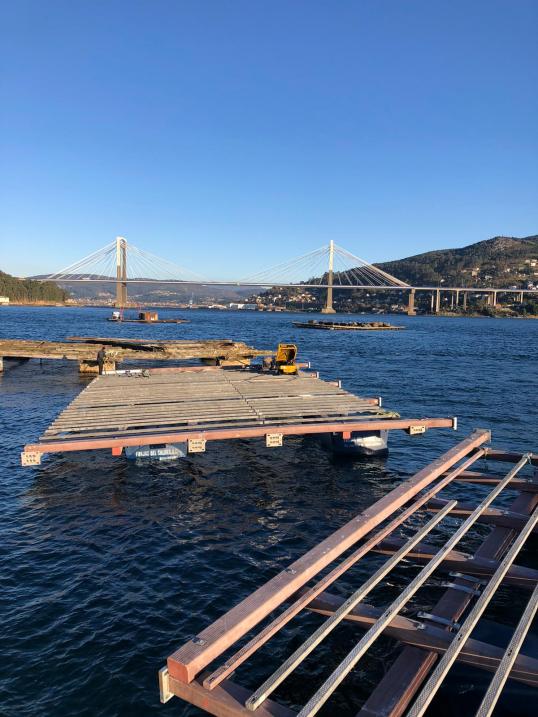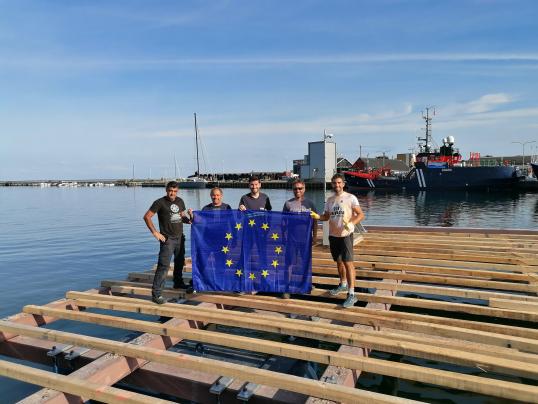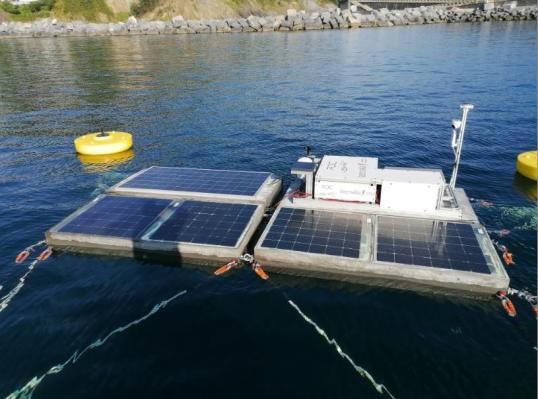Aquaculture production has been growing at a very slow pace in the EU over the last few years, due, among other things, to cumbersome licencing procedures, increasing global competition, and saturation of areas where farming is viable. All of these barriers call for a sustainable intensification of farming systems to achieve economies of scale that would make it possible to boost production while at the same time containing costs and use of marine space.
Masters at farming shellfish, the Galicians devised the “raft”, an ingenuous tool consisting of a 540-m2 floating structure that can produce up to 100 tonnes of mussels per year, making it the most efficient system per square metre in the world. Suffice it to say that when the raft was invented in the 20th century, the number of floating farms in Galicia went from 400 in 1956 to over 3,000 in the ‘90s!
Traditionally, rafts have always been made of eucalyptus wood, but in 2016 RDC, a Spanish company, designed a raft made of Formex®, ultra-high-performance concrete (UHPC) that lasts up to 5 times more than traditional rafts and without maintenance needs. The structure is produced by PREFFOR, a precast company specialised in UHPC and created by the same founders as RDC.
The first design of the Formex® raft was conceived to address the needs of Galician farmers. But what about farmers from other EU regions?
“We wanted to diversify our market, but that required large-scale demonstration, as farmers would have never paid for a technology that had not been tested before. That required a significant investment, and we were aware that only through EMFF funding we would have been able to carry out such a large-scale demonstration”
Esteban Camacho, CEO, RDC
This is where OpenMode came into play. OpenMode was a project funded under the European Maritime and Fisheries Fund EMFF (now European Maritime Fisheries and Aquaculture Fund - EMFAF), which run from November 2019 to October 2021. It was carried out by RDC and PREFFOR with the aim of testing floating modules for intensive farming in the Atlantic Ocean, the Mediterranean and the North Sea. RDC’s platforms were redesigned towards portable and versatile modules; the project team integrated state-of-the-art remote sensors to control water, as well as weather and structural parameters to ensure surveillance, reduce operating costs and leverage big data analytics to determine the decisive factors that affect harvest growth rates.
Nine prototypes were installed in Spain, Denmark, Croatia and Montenegro, where local farmers are still using them today to grow mussels. The project success has instigated the concept of intense farming in high-potential unexploited areas, which in the future may become an efficient tool to combat eutrophication in the North and Baltic Sea.
Thanks to OpenMode, RDC and PREFFOR have gained precious experience with the logistics and bottlenecks of floating modules also outside Spain, thus being able to talk to potential clients and institutions with renewed confidence. Their modules have attracted interest from farming companies in Chile, whereas in Galicia demand increased from 4 rafts in 2021 to 12 rafts in 2022, and 21 in 2023.
And the best is yet to come: as part of OpenMode communication campaign, RDC and PREFFOR got in touch with FreShER, another EMFF-funded project that dealt with mooring solutions for floating solar arrays. Turned out that Formex® could be used to produce the pontoons of the Alqueva plant, the largest floating solar system ever installed in an EU dam. This was the first foray of PREFFOR into the energy sector and made up 30% of their turnover in 2021, thus opening a wide spectrum of possibilities: saying that this was an unexpected impact of the project would be a massive understatement!
When nudged to reveal the secret to their success, Esteban Camacho, CEO of RDC, said that “a grant proposal should be a tool to implement an innovative business opportunity that a company already has in mind, not an idea specifically developed to get EU funding. Only if it is driven by a potential business opportunity it will really work during and after the project period”.



